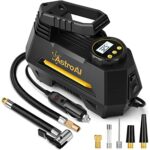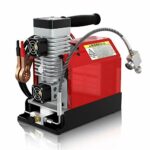Tank Pressure Does Not Reach Cut Off: One of the issues, when an air compressor will not shut off, is that the tank pressure never reaches the cut out setting to allow the pressure switch to trip to off which normally results in the pressure switch cutting power to the compressor motor and the air compressor shuts off. That the air compressor will not shut off then, yet continues to run and the pressure in the tank continues to rise, indicates that the pressure switch has not tripped to off. The other scenario when the air compressor will not shut off is that the pressure in the tank reaches a pressure level below the normal cut out pressure level, and the pressure in the tank will go no further.
When an air compressor will not stop it could signal a problem with how the air compressor is pumping air into the compressor air tank. If an air compressor runs, pumps air into the air tank, the tank pressure reaches the normal cut out pressure setting level, and the compressor continues to run and the pressure continues to build, this is a real problem! Eventually the PRV will let go, and the tank pressure should vent. The air compressor can pump air pressure into the tank to a level higher than the compressor is supposed to.
Keep on reading to go to the 10 quickest fixes for an air compressor that won’t stop running. Check out these 10 fixes for an air compressor that won’t stop running. We’re sure that these 10 fixes for an air compressor motor that won’t stop running will get your air compressor back up and running.
In some instances, you will encounter your machine seems tireless, meaning it doesn’t want to turn OFF. Other air compressors, due to age, need that extra push to the switch just to turn OFF. However, if the problem lies in the continuous pumping of air to the air compressor tank and generally it won’t stop, this is a serious alarm. So when the cut out pressure setting level doesn’t stop the air compressor from working, the PRV will then handle all the excess air pressure by opening the vent to let some air out. One of which is when your air compressor is not able to pump the necessary air to reach the cut out pressure switch level.
These pressure switches pay attention to two different pressures: at what point the compressor motor should turn on, and at what point it should turn off. Pressure switches are critical as they help provide safety both to those around the air compressor as well as to the components of the compressor itself. It can be frustrating to deal with a compressor that does not build pressure or a compressor that does not turn off.
If you shut off the air compressor on full charge, yet the gauge drops while the compressor is deactivated, you definitely have an air leak. Air leaks from under the hood are sometimes encountered on smaller air compressors. Many newer air compressors – particularly those on the lower-cost end of the spectrum – blow air with fans made of plastic, which is less expensive than metal but is also more easily prone to wear and tear.
One of the most alarming things that can happen in your workshop is if your air compressor will not shut off. An Air compressor that will not shut off is a dangerous problem and one that needs to be solved quickly. Below are a few things that could be causing it and how you can solve them in order for your air compressor to shut off.
why doesn’t my air compressor shut off Related Question:
What causes air compressor to keep running?
Reciprocating units need time to stop and cool off, or the internals will become damaged. When damage occurs, the compressor can experience valve failures, causing the compressors to run constantly. If your reciprocating compressors are never turning off, you should investigate.
Why does my compressor not turn off automatically?
If the air pressure in the tank doesn’t reach the normal cut out pressure level, and since then the air compressor can’t shut off as the pressure never reaches the cut out pressure level, then look to the intake valve or internal gasket leak as the possible source of the problem.
Can a compressor runs continuously?
Only those air compressors with a 100% duty cycle can run constantly at the specified pressure and flow. Running an air compressor beyond its duty cycle limit leads to premature wear and tear, higher maintenance costs and, at its most extreme, breakdowns which can shut down production.
Why is my air compressor building too much pressure?
Pressure restrictions often result from improper attachments or faulty machine piping. Defective piping and attachments are common in components like hoses, filters and end-use connectors, and they can cause overcompensation in the air compressor.
How long can an air compressor run continuously?
How long can you leave a compressor running? Depending on the size and type of compressor, air compressors can be left running anywhere from a few hours to 24 hours a day, seven days a week.
How does a compressor shut off?
The air compressor pressure switch measures the pressure inside your air tank and shuts off your compressor when it reaches the air pressure you need.
Can an air compressor explode?
Yes, air compressors can blow up. Air compressor explosions are most commonly caused by substantial corrosion of the compressor tank. Excessive condensation leads to corrosion, and you can avoid this outcome by monitoring and servicing the compressor and its auxiliary components.
What PSI should a compressor shut off?
The motor on the compressor should cut off when the pressure reaches 140-160 psi. The motor should come on when the pressure drops to 130-120 psi.
What PSI should I set my air compressor?
Most air tools require between 70 and 90 PSI. Any light-to-medium-duty air compressor can easily handle 90 PSI, but you always want the compressor to supply more flow than needed. Pro Tip: Always respect a PSI rating. If you don’t supply enough air volume, the tool won’t operate correctly.
Do air compressors shut off automatically?
If the compressor builds pressure then shuts off while air continues to bleed from the unloader valve on the pressure switch that means the check valve is leaking. The oil less tank mounted units do not have an unloader but if no leaks are found on the unit or in the piping then the check valve is leaking.
How many hours will a compressor last?
On the other hand, rotary screw compressors have an average lifespan of between 35,000 and 40,000 hours. They run at high speeds and tend to be very loud, so they should be kept in a dedicated compressor room when in use.
What setting on a compressor pressure switch must be adjusted to keep the compressor from constantly cycling?
A rule of thumb is that the pressure differential of at least 1 bar (14 psi). If the difference between the cut-in pressure and the cut-out pressure is set too small, the compressor will quickly start and stop repeatedly.
Where is the unloader valve on an air compressor?
Where Is the Unloader Valve Located? If you own a smaller reciprocating air compressor, you’ll likely find the unloader valve mounted on or inside the pressure switch. When the switch shuts the compressor off, it actuates the valve.
What is the minimum air pressure of the main air compressor on board?
Main air compressor: These air compressors are high-pressure compressors has a minimum pressure value of 30 bars and used to run the main engine.
What is a constant duty air compressor?
Continuous duty air compressors are designed to run for longer periods of time. They are ideal for air tanks, air horns, low riders, air tools and other situations where you have a frequent demand for air.

